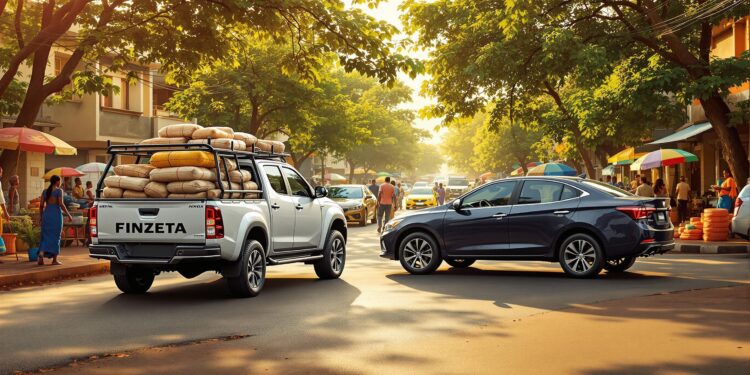Choosing between diesel and petrol vehicles in Tanzania depends on your driving habits, location, and budget. Here’s a quick breakdown to help you decide:
- Diesel vehicles: Higher upfront cost but better fuel efficiency and torque. Ideal for long-distance travel and rural areas.
- Petrol vehicles: Cheaper to buy and maintain, with better acceleration. Perfect for city driving and frequent stops.
Quick Comparison
| Factor | Diesel | Petrol |
|---|---|---|
| Initial Cost | Higher | Lower |
| Fuel Economy | Better | Moderate |
| Maintenance Cost | Higher | Lower |
| Resale Value | Higher | Lower |
| Engine Performance | More Torque | More Power |
If you drive mostly in urban areas like Dar es Salaam, petrol is a better choice due to lower maintenance and easier handling in traffic. For rural areas or heavy loads, diesel offers durability and efficiency. Keep reading for more details on fuel costs, maintenance, and emissions.
Diesel Fuel Showdown: Petrol Diesel vs. BioDiesel vs …
Fuel Supply and Costs in Tanzania
Understanding fuel supply in Tanzania can help you decide whether diesel or petrol suits your driving needs best.
Current Fuel Prices
In Tanzania, diesel generally costs less than petrol. This price difference plays a role in determining long-term operating expenses.
Fuel Distribution Network
The fuel distribution system in Tanzania is primarily focused on urban areas. Major import hubs and storage facilities ensure cities have a steady supply. However, logistical issues can lead to occasional price changes in different locations. These factors influence how fuel is distributed and accessed in urban versus rural settings.
Urban vs. Rural Fuel Access
Urban areas enjoy a well-established network of fuel stations, which helps stabilize prices and ensures availability. In contrast, rural regions often deal with longer distances between stations and potential supply delays. For rural drivers, these challenges make vehicle fuel efficiency and tank capacity more critical.
Running Costs
When looking at running costs, it’s important to think beyond just the purchase price. Factors like fuel efficiency, maintenance, and fluctuating fuel prices play a big role in the overall cost of owning a vehicle. Let’s break it down.
Fuel Economy
Diesel engines are known for better fuel efficiency, particularly during long highway drives. This can lead to noticeable savings on fuel over time. This edge becomes even more relevant when shifts in global oil prices affect local fuel costs. On the other hand, petrol engines typically cost less upfront but use more fuel, which can add up over time.
Ownership Expenses
Diesel vehicles come with a higher price tag and cost more to maintain. However, petrol vehicles are cheaper to buy and benefit from easier access to parts and lower service costs. That said, petrol’s lower fuel efficiency means you’ll likely spend more on fuel over the vehicle’s lifetime. It’s a trade-off: higher upfront and maintenance costs for diesel versus lower initial and servicing costs for petrol.
Fuel Price Effects
The ups and downs of global oil prices have a big impact on local fuel prices. Diesel tends to be more stable in price compared to petrol, making it easier to predict and budget for over the long haul. Changes in fuel prices can significantly affect how much you spend to keep your vehicle running.
sbb-itb-d9186c2
Service and Lifespan
Diesel Engine Care
Diesel engines are built to handle high compression ratios and operate within a lower RPM range (3,000–5,000). With proper maintenance, they can last between 500,000 and 1,000,000 kilometers. However, in Tanzania, maintaining diesel engines can be costly due to expensive fuel system components and the strict requirements for fuel quality.
"Diesel engines are often found in heavy-duty commercial equipment where they’re expected to run continuously. To ensure they stand up to those harsh conditions, diesel engines are built tough, and that means their lifespan is hard to beat." – KS Mobile Diesel
While diesel engines are known for their durability, petrol engines stand out for their easier and less expensive maintenance.
Petrol Engine Care
Petrol engines, operating at higher RPMs (6,000–8,000), typically have a lifespan of 200,000 to 300,000 kilometers. Although they don’t last as long as diesel engines, they make up for it with simpler maintenance routines, lower repair costs, and easier access to replacement parts.
Regular servicing is crucial to getting the most out of a petrol engine. With lower costs for parts and repairs, maintaining these engines is often more straightforward than their diesel counterparts. However, both engine types are highly affected by the quality of fuel available locally, which is explored in the next section.
Local Fuel Quality Impact
Fuel quality plays a significant role in the performance and lifespan of both diesel and petrol engines in Tanzania.
"High-quality diesel fuel is essential for maintaining the optimal functioning of diesel engines. Poor-quality fuel can lead to various issues such as engine knock, reduced fuel efficiency, increased emissions, and accelerated wear and tear on engine components." – JAT Energy
For diesel engines, high sulfur levels in fuel (above 5,000 PPM) can be particularly damaging. This often requires halving oil change intervals to protect the engine, especially since many modern European engines are designed for fuel with sulfur levels below 15 PPM.
| Maintenance Factor | Diesel Impact | Petrol Impact |
|---|---|---|
| Oil Change Interval | More frequent with high sulfur fuel | Standard intervals |
| Filter Replacement | Crucial due to fuel contamination | Regular schedule |
| Engine Durability | Handles higher compression stress | Lower stress tolerance |
| Repair Costs | Higher due to expensive components | Lower due to affordable parts |
To extend engine lifespan under Tanzania’s fuel conditions, consider these steps:
- Use high-quality fuel from trusted stations.
- Stick to manufacturer-recommended service intervals.
- Replace fuel filters frequently to prevent contamination.
- Allow the engine to warm up properly before heavy use.
- Use engine oils suited to local conditions for better performance.
Emissions and Air Quality
Diesel Engine Emissions
Diesel engines present a major challenge in Tanzania, especially in Dar es Salaam, where vehicle numbers are growing at a rate of 6.3% each year. This rapid increase has led to nitrogen oxide levels nearly 10 times higher than those recorded in the United States. The primary cause? An aging fleet of vehicles with poor energy efficiency.
Petrol Engine Emissions
Petrol engines, on the other hand, emit nitrogen oxides and carbon monoxide at levels comparable to diesel engines. However, petrol engines are particularly concerning due to their higher carbon monoxide emissions. While they produce less particulate matter than diesel engines, the carbon monoxide output remains a significant issue.
Local Air Quality Factors
Urban conditions in Dar es Salaam further exacerbate air quality problems. Heavy traffic on limited road networks and the presence of high-rise buildings that inhibit ventilation contribute to the problem. Compressed natural gas (CNG) is emerging as a potential solution. By 2022, only 0.08% of Tanzania’s 1.92 million vehicles had been converted to run on CNG. These CNG-powered vehicles offer benefits like reduced carbon emissions, lower particulate matter, and better fuel efficiency – especially for vehicles with larger engines. This situation underscores the tough decisions Tanzanian drivers face when choosing between engine types.
Best Cars for Tanzania
Top Diesel Models
Toyota dominates Tanzania’s diesel market with durable and versatile vehicles. The Land Cruiser 300, starting at $115,000, is perfect for premium off-road adventures and executive transport. For commercial needs, the Coaster ($110,500) and HiAce ($61,200) are excellent choices. Meanwhile, the Hilux ($39,800) and Fortuner ($58,000) stand out with their reliable 2.8 GD-6 engines, offering great performance for business, agriculture, and family use.
| Vehicle Model | Starting Price | Best Use Case |
|---|---|---|
| Land Cruiser 300 | $115,000 | Off-road, executive transport |
| Coaster | $110,500 | Commercial passenger transport |
| HiAce | $61,200 | Urban delivery, passenger shuttle |
| Hilux | $39,800 | Business, construction, agriculture |
| Fortuner | $58,000 | Family transport, moderate off-road |
Top Petrol Models
Toyota’s petrol vehicles are ideal for city driving, combining efficiency and affordability. The Corolla Cross Hybrid, priced at $57,200, offers a blend of petrol and electric power, making it perfect for urban commutes. The Urban Cruiser ($31,400) and Rumion ($27,000) are great for city performance, maintaining Toyota’s reputation for reliability and cost-effectiveness.
Choosing by Location and Budget
Selecting the right vehicle depends on your location and budget. In urban areas like Dar es Salaam, petrol models such as the Rumion or Urban Cruiser are ideal for smoother, quieter operation. For rural areas or long-distance travel, diesel models like the Hilux or Fortuner are better suited due to their durability and efficiency.
Key factors to consider:
| Factor | Diesel Advantage | Petrol Advantage |
|---|---|---|
| Initial Cost | – | Lower purchase price |
| Long-term Cost | Better fuel efficiency | Lower maintenance costs |
| Durability | Longer engine life | – |
| Urban Use | – | Quieter operation |
| Rural Use | Better altitude performance | – |
| Resale Value | Higher resale value | – |
For city dwellers, the Rumion is a practical choice. On the other hand, the Hilux and Fortuner are excellent for rural driving and extended travel.
Conclusion
Diesel engines are known for their durability, as noted by industry experts:
"Diesel engines are generally more rugged than petrol engines, as they have to withstand higher compression ratios; this means better longevity." – Open Road
However, the growing number of vehicles in urban areas like Dar es Salaam, where the annual increase is 6.3%, raises concerns about emissions. With exhaust levels reported to be 10 times higher than U.S. standards, choosing newer, more efficient vehicles becomes increasingly important. Deciding between diesel and petrol engines often comes down to balancing usage needs with long-term efficiency.
For city driving, petrol vehicles are often more appealing due to their lower purchase and maintenance costs. On the other hand, those covering long distances or hauling heavy loads may find diesel engines a better fit thanks to their fuel efficiency and longevity. Regardless of the choice, regular maintenance is key to extending engine life. For example, some Mercedes-Benz vehicles have surpassed 900,000 miles on their original engines.
When deciding which engine type suits you best, consider these factors:
- Driving environment: Are you primarily in urban or rural areas?
- Annual mileage: How far do you plan to drive each year?
- Load requirements: Will you be carrying heavy cargo regularly?
- Budget: What is your upfront spending capacity?
- Long-term plans: How long do you intend to keep the vehicle?
Consistent upkeep and informed decisions about fuel type will ensure your vehicle performs well, no matter which engine you choose.
Related posts
- 5 Most Fuel-Efficient Cars Available in Tanzania 2025
- Top Fuel-Efficient Cars for Long-Distance Drives in Tanzania
- Best used cars in Tanzania 2025
- Car prices in Dar es Salaam




